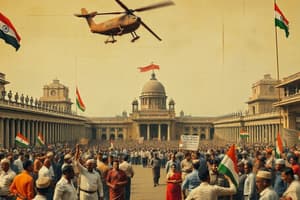Podcast
Questions and Answers
What was a common goal shared by prominent figures like Bal Gangadhar Tilak, Mahatma Gandhi, and Jawaharlal Nehru in the context of Indian independence?
What was a common goal shared by prominent figures like Bal Gangadhar Tilak, Mahatma Gandhi, and Jawaharlal Nehru in the context of Indian independence?
- To create a united and sovereign nation (correct)
- To maintain British colonial rule
- To establish separate regional states
- To promote religious conflicts
Which organization consistently promoted an inclusive vision of India based on mutual respect among communities?
Which organization consistently promoted an inclusive vision of India based on mutual respect among communities?
- Muslim League
- Hindu Mahasabha
- Dalit Panthers
- Indian National Congress (INC) (correct)
During the Partition period, which INC leader played a crucial role in maintaining peace and ensuring fair treatment of minorities in India and Pakistan?
During the Partition period, which INC leader played a crucial role in maintaining peace and ensuring fair treatment of minorities in India and Pakistan?
- Sarojini Naidu
- Subhas Chandra Bose
- Bal Gangadhar Tilak
- Jawaharlal Nehru (correct)
What characterizes India's character even today, as mentioned in the text?
What characterizes India's character even today, as mentioned in the text?
What did the government formed by the INC ensure throughout subsequent years, according to the text?
What did the government formed by the INC ensure throughout subsequent years, according to the text?
Why do many consider the Indian National Congress' foundations integral to the successes of contemporary Indian society?
Why do many consider the Indian National Congress' foundations integral to the successes of contemporary Indian society?
What was the main aim of the Indian National Congress when it was founded in 1885?
What was the main aim of the Indian National Congress when it was founded in 1885?
Which values did the Indian National Congress promote as it evolved into a powerful force?
Which values did the Indian National Congress promote as it evolved into a powerful force?
What kind of concerns did the elite educated Indians discuss during the early years of the Indian National Congress?
What kind of concerns did the elite educated Indians discuss during the early years of the Indian National Congress?
Who were some of the individuals involved in founding the Indian National Congress in December 1885?
Who were some of the individuals involved in founding the Indian National Congress in December 1885?
How did the Indian National Congress contribute to fostering unity in India?
How did the Indian National Congress contribute to fostering unity in India?
In what way did the Indian National Congress's early pursuits help towards eventual self-governance?
In what way did the Indian National Congress's early pursuits help towards eventual self-governance?
Flashcards are hidden until you start studying
Study Notes
Nationalism in India: A Glance at the Indian National Congress's Contributions
Nationalism is a complex concept with deep roots in history. In India, it's a multifaceted story involving various ideologies, movements, and organizations, one of which was decisively pivotal—the Indian National Congress. As we delve into nationalism within India, let's explore how this historic political party contributed to fostering unity, championing freedom, and shaping modern India.
The Indian National Congress (INC) was founded by a group of remarkable individuals such as Allan Octavian Hume, Womesh Chandra Bonnerjee, Dinshaw Edulji Wacha, and others in December 1885. With its origins rooted in British colonial rule, the INC initially aimed to address issues faced by educated Indians through dialogue rather than direct action against the Raj. However, over time, the organization evolved into a powerful force championing independence from Britain while promoting values like plurality, secularism, democracy, and social equality.
Early Days of the INC: Advocacy and Reforms
During its early years, the congress functioned mainly as a platform where elite educated Indians could discuss their concerns regarding education, representation, judicial proceedings, and other administrative matters. At first glance, these pursuits might seem tangential to achieving full independence; however, they were essential steps towards building a strong foundation necessary for eventual self-governance.
In the following decades, prominent figures such as Bal Gangadhar Tilak, Mahatma Gandhi, Jawaharlal Nehru, Sarojini Naidu, and Subhas Chandra Bose emerged as leaders who galvanized mass support behind the cause of Indian independence and presented alternative visions for the country's future. These luminaries had diverse philosophies yet shared common goals—to create a united and sovereign nation.
The INC: A Pillar of Integrated Nationalism
While Indian nationalism manifests itself in numerous ways, throughout the congress's existence, it consistently promoted an inclusive vision of India based on mutual respect and understanding among communities, regardless of religious, linguistic, ethnic, and regional differences. It sought to unite disparate groups under the banner of a single, indivisible Indian state.
As tensions between India and Pakistan grew during Partition period in late 1947, INC leaders like Jawaharlal Nehru played crucial roles in maintaining peace and ensuring fair treatment of minorities in both countries. This spirit of tolerance and compassion continues to define India's character even today.
Throughout subsequent years, government formed by the INC ensured continued growth and development of the country alongside nurturing democratic institutions and safeguarding fundamental rights of citizens. Today, many consider INC's foundations integral to the successes of contemporary Indian society.
Conclusion
In conclusion, although much has changed since the founding days of the Indian National Congress, the organization remains a cornerstone of India's storied journey toward collective emancipation and national identity formation. Its contributions in cultivating an integrated nationalist consciousness, fostering constructive dialogue amongst diverse sections of society, and providing leadership through challenging times continue to inspire generations of Indians seeking a bright and prosperous future for themselves and their beloved homeland.
Studying That Suits You
Use AI to generate personalized quizzes and flashcards to suit your learning preferences.



